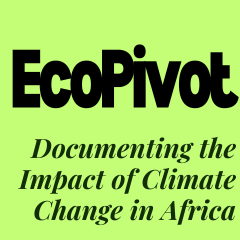Perfect Johndick, an environmental advocate in Nigeria, has seen firsthand how misinformation affects public perception. Drawing from her experience, she tells EcoPivot that fighting misinformation is both frustrating and hopeful.
Many Nigerians see the floods, heatwaves, and droughts, yet dismiss climate change. Perfect believes the answer lies in how the message is framed: “If you call it ‘environmental change,’ no one argues.”
As a climate advocate in Nigeria, Perfect focuses on debunking myths, educating communities, and engaging skeptics. Instead of using technical terms, she simplifies climate discussions to make them more relatable.
“Communities have been victims on several occasions, so I don’t use vocabularies to describe their problem. You learn what every issue means in their dialect and relate it that way.”

Spread of Climate Misinformation
Climate misinformation spreads easily through social media platforms like WhatsApp, Twitter/X, and Facebook in Nigeria. False claims and conspiracy theories travel fast, especially when amplified by religious and political figures.
“Whatever comes to social media was birthed somewhere,” says Perfect Johndick. “There have been misinterpretations and unhealthy knowledge transfers to people who only have elementary knowledge.”
One of the most common myths is that climate change is a Western hoax. Some believe it is a strategy by developed nations to control Africa’s resources. Others claim that natural disasters like flooding are not climate-related but simply due to poor drainage.
“Religion has made a lot of ignorant people call it God’s wrath, culture has defined it as plagues from the gods, while politics has taken advantage of it financially,” she explains.
A report by DW in 2023 explains that misinformation thrives because many Nigerians lack access to verified information. According to the report, low media literacy makes it harder for people to separate facts from fiction. Some also distrust scientific institutions, seeing climate policies as foreign impositions.
Why Do People Believe Climate Misinformation?
Perfect has answers:
“I think it’s in the technical terms around it. If we could keep it simple by saying Environmental Changes. When people don’t understand the science, they are more likely to believe false claims that seem easier to grasp.”
“Politics has taken advantage of it in terms of finances and as a tool to impoverish frontline communities,“ Perfect says. Oil workers and farmers, for example, may see climate action as a threat rather than a solution.
Real-World Consequences
Climate misinformation significantly delays action at all levels, from government policies to community efforts and individual behavior.
For instance, in Nigeria, false narratives such as “climate change is a Western hoax” undermine public trust in scientific evidence, leading to skepticism about climate policies and preventive measures.
This misinformation often stems from political or economic interests, as seen in the case of flooding in Lagos, where poor drainage systems and urban planning worsen the crisis. Despite scientific warnings, misinformation downplays the urgency of addressing these issues, leaving communities unprepared for recurring floods.
As Vanessa Nakate, a climate activist and UNICEF Goodwill Ambassador, states, “Fossil fuel companies knew their actions were disrupting our climate, yet they continued and hid this information from the public. This is greenwashing“.


